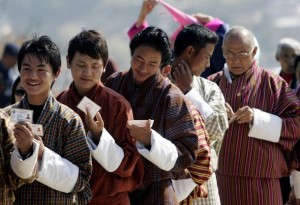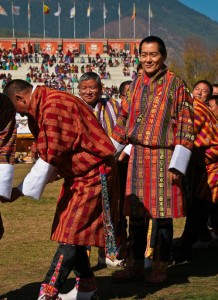Democracy in Bhutan: a silver lining
‘Democracy is the government by the people, for the people and of the people,’ a definition taught at school level rings in my mind. It was the ICSC curriculum of Indian history and civics taught in Bhutan that gave a cursory knowledge of democracy to younger generation of Bhutan. Had it not been for the tight grip of absolute monarchy controlling freedom of citizens, the knowledge of history and politics of India would have greater influence on Bhutanese students long ago. Never too late, the 1990 and 1997 uprising of Bhutanese citizenry was a call for appropriate form of democracy in the country.
Bhutan is said to be undergoing sweeping changes since the last decade and King Jigme Singye’s abdication of throne is much applauded for creating an environment of transition to democracy. With the drafting of written constitution under the auspices of Indian experts in 2001, came along the unprecedented formation of several constitutional bodies that Bhutanese feudal polity had not known adequately. Opening of ground for political parties to contest in elections, creation of an election commission, allowing private media to operate, formation of anti-corruption commission as a constitutional body and some judicial reforms are few changes to break ice. Parliament has begun to form various committees needed for democratic pattern of decision making process exhibiting transparency and accountability, but has not been far from influence of palace related forces. Fundamental rights are spelled in the constitution, but the public remain uninformed about them. Media is infant and therefore, often taken to hostage by the government. A headmaster of school from south central Bhutan, after serving his country for 25 years, worries about a secured future in Bhutan owing to his relationship to refugees in camp. The country is at present under two monarchs: a senior and experienced one acting backstage, and his junior learning to hold power with his juvenile brain.
Gifted democracy
The pseudo-democracy came as a surprise gift to many Bhutanese who even take it as a privilege to them. An average Bhutanese do not know what is the content of constitution, what expertise prepared it and what it is for. For the people who do not read and write Dzongkha and English, the constitution is only a document in Greek because there is no translation in their language. The constitution as the supreme law of a democratic country is not yet established in Bhutan for the government officers can arbitrarily question any person any time or summon to the office for no valid reason. The members of parliament, the district administrators, high-placed officers and the sub-divisional officers assisted by police and army address the public in the form of orders passed from high source. The party leaders, who happened to be the aristocrats with posh living, now act as the champions of democracy. Jigmi Thinley and Sangay Ngedup have been favored to run parties and contest for the election, without much experience to campaign and raise voter’s participation. Jigmi Thinley led DPT was unceremoniously declared as the largest party to form democratically elected government. The two party heads having close matrimonial ties with the Wangchuk dynasty, do not seem bothering about the functioning of democratic institutions, at least required to provide legitimacy of their own representation in the parliament.
The high court of Bhutan is by no means free to interpret and serve as the guardian of constitution because of its very establishment by the favor of king. It is not even in the capacity to function within the parameters of a constitutional monarchy. Again, it is not impartial enough to prove any government official or royal relatives guilty, if a case is filed against them by public. As long as the judicial body, and particularly the apex court, continues to remain feeble in its jurisdiction procedures, Bhutanese democracy will only be a gift of palace.
It can be inferred that democracy in Bhutan is released open from its magical package by the king out of benevolence, without the actual ground work preparations so that the public could participate more freely in the governance.
Planning process and democracy
Fundamental principles of democratic governance are not seen to be incorporated in the plan documents. The ninth plan document is developed as the poverty reduction strategy paper aimed to combat poverty. The document has envisioned a twenty year perspective plan called Bhutan 2020: vision for peace, prosperity and happiness. Interestingly, nowhere in the paper one can trace the strategic framework towards institutionalizing grass-root democracy in order to combat poverty. The actual data on poverty is too meager; the causes of poverty and its ramifications are not identified, and the process of collecting data is not reliable one. Given the wide gap of poverty incidence between rural and urban areas (41.3 percent rural and 6.4 percent urban) according to the PRSP document, good governance based on fair and equitable allocation of resources is the dire need. Enhancing capability of local institutions, promoting organized and informed decision-making or participating by people at village level, securing the rights of people to derive benefits from the exploitation of natural resources are not recognized in the ninth plan document. That the government seems to forget its past failure, decentralization is once again revived with the same traditional system of DYT and GYT coming to the scene. They cannot function as the democratic organizations to foster wider public participation in the development activities, rather use unnecessary force to compel people do what they do not wish. The planners have completely ignored the fact that the country is soon transitioned to democracy and planning or preparing the plan document requires in depth knowledge of how democracy functions or what are its pre-requisites.
The tenth plan period is essentially a period of reforming and restructuring of the bureaucracy, feudal political offices, security networks and all policies of limiting people’s freedom. The guidelines prepared for the ten FYP is a welcoming document to attract the donors as it emphasizes on poverty reduction, infrastructure building and environmental sustainability by intake of foreign loans and grants. It barely speaks of the remodeling of traditional institutions to cope up the transition, except for its rhetoric of good governance that clearly lacks the will power.
Democracy versus GNH
The proponents of GNH philosophy have been reiterating that Gross National Happiness is more important than Gross National Product. It is well incorporated in the plan documents as the guiding principle of material development. The ninth plan document in section 2.4 states: GNH has been the guiding principle of socio-economic development for the last two decades and continue to do so in the future. Four conferences went off in making GNH an internationally accepted principle, books on GNH written, measures to quantify GNH level are processed and some measurement techniques applied to GNH, but all without the real motive of making Bhutanese people happy. In their truest sense, democracy and GNH complement each other if the planning process and policy formulation actually integrate them. If GNH is the holistic approach to individual happiness above material satisfaction, democracy is the holistic process to achieve collective happiness in terms of material well-being, governance, human rights and supremacy of law.
Democracy and media
Media is considered as the fourth organ of any state. Media in Bhutan is infant and therefore at a precarious ground. Unbiased and independent reporting by the media help public to make well informed decisions and avoid inconsistency in governance. Bhutanese media is now not in a position to accomplish the task of disseminating information effectively. The DPT government has often taken to the course of hair-plucking of media. Bhutan Times is under the financial pressure to exist in the market. Bhutan Today, the only private daily, strives to compete with state owned kuensel which recently launched daily paper. The development of media in a span of a decade is, however, welcoming.
It is painful for the independent Bhutanese media persons to report news fairly enough as many sources of information deny access to them. There has been always a skewed coverage of the information region wise, content wise, source wise and even by gravity of the information. Newspapers and their news portals are not available to interior parts or remote hinterlands owing to the transportation and technological deficiency. The hard copies are not published in the mother tongue of Lhotshampa (Nepali speaking) and Sarchhops, who speak Tsangla. So, a section of the population who do not understand English or Dzongkha remain uninformed by this gap of information. Broadcasting media are too limited in information flow and are susceptible to censorship.
In the light of above discussions democracy in Bhutan need to be understood in a preliminary phase with all contradictory elements and reactionary forces occupying the ground. As always seen in the history, there are forces around palace who wish to take extraordinary advantage of their kinship ties with royal family, if any chance. Exclusion and elimination of opposing force is a long tradition in Bhutan; democrats can be intimidated or virtually eliminated because of high-handedness of reactionary forces. Transparency and accountability are buzz words but hard to realize. Bhutanese people have already lost about 10,000 square meters of their country’s north-west part changing the map of country, just when there was the king to protect the cessation. Has the people of Bhutan been well informed about this?


